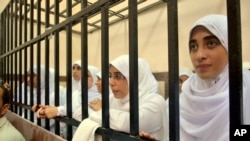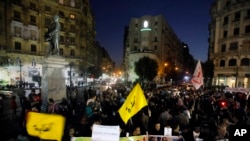CAIRO —
Two high-profile Egyptian trials, both arising from years of turbulent protests, have delivered sharply contrasting sentences in the space of just a few months.
In March, a policeman was convicted of shooting at protesters, deliberately aiming at their eyes, during demonstrations in November 2011. The man dubbed the 'eye sniper' was sentenced to three years in prison.
This week, 21 women and teenage girls were found guilty of obstructing traffic during a pro-Islamist protest last month. The 14 women were imprisoned for 11 years, while the seven under the age of 18 were sent to juvenile prison.
The verdicts stunned the opposition and rights campaigners, even by the standards of a crackdown in which security forces have killed hundreds of Islamists and arrested thousands since the army overthrew President Mohamed Morsi of the Muslim Brotherhood in July.
“The ruling was shocking. We could not believe that Egypt would lock up its girls with the excuse that they are a threat to security,” said Ramadan Abdel Hamid, whose 15-year-old daughter Rawda and wife Salwa were among those sentenced.
“Is this what is going to calm Egypt?”
As army chief General Abdel Fattah al-Sisi implements a promised roadmap towards elections, the United States is watching closely and has repeatedly urged the interim government to treat its opponents with restraint.
Since Morsi's fall, it has frozen some military aid to Cairo. The European Union has been encouraging political reconciliation in a bid to stabilize Egypt, which has a peace treaty with Israel and controls the strategic Suez Canal.
Pardon sought
The security forces have been lionized by state and private media which denounce the Brotherhood as terrorists. But convicting women and girls who back Morsi has raised the campaign to a new level that could risk provoking a backlash.
So far there have been no street protests against the sentences, but criticism has appeared on social media.
Leftist leader Hamdeen Sabahi called for a presidential pardon, even though he is a fierce opponent of the Brotherhood.
The sentences could give the unpopular Brotherhood some political ammunition as it tries to recover from the crackdown that has all but decimated the movement.
In a statement, an alliance of pro-Brotherhood parties said: “The judiciary rules against the girls of Alexandria within days and goes at the speed of a tortoise in the trial of Mubarak and his gang.”
It said the verdict “proved that the independence of the judiciary has passed away”.
Delicate issue
Street protests are a highly sensitive issue in a country where people power has led to the downfall of two presidents in less than three years, beginning with veteran autocrat Hosni Mubarak in 2011. The sentencing of the women and girls coincided with tensions over a law passed on Sunday that tightly restricts demonstrations.
While many Egyptians support Sisi and his roadmap, even non-Islamists are becoming more critical of the military, suggesting the authorities may have to tread more cautiously.
“I was surprised by how quickly this case was decided,” said Anwar El Sadat, a former member of the People's Assembly and chairman of its Human Rights Committee. “I was hoping they would show some mercy, especially because it's women and girls.”
Tamara Alrifai of U.S.-based Human Rights Watch described the case as “shocking”.
“The seven girls are underage and considered children,” she said. “It is part of a wider campaign to put a halt to protests. People seized the right to protest in 2011 and they are trying to take it away from them.”
Relatives of the women and girls have condemned the court ruling, but said it would strengthen their resolve against what they call the military coup to remove Morsi.
Sohanda Abdel Rahman, 13, said she could not believe her mother was sentenced to 11 years in jail.
“This is an oppressive and political sentencing,” she said after visiting her in prison. “But we began the path and know what will happen to us and we will not retreat.”
In March, a policeman was convicted of shooting at protesters, deliberately aiming at their eyes, during demonstrations in November 2011. The man dubbed the 'eye sniper' was sentenced to three years in prison.
This week, 21 women and teenage girls were found guilty of obstructing traffic during a pro-Islamist protest last month. The 14 women were imprisoned for 11 years, while the seven under the age of 18 were sent to juvenile prison.
The verdicts stunned the opposition and rights campaigners, even by the standards of a crackdown in which security forces have killed hundreds of Islamists and arrested thousands since the army overthrew President Mohamed Morsi of the Muslim Brotherhood in July.
“The ruling was shocking. We could not believe that Egypt would lock up its girls with the excuse that they are a threat to security,” said Ramadan Abdel Hamid, whose 15-year-old daughter Rawda and wife Salwa were among those sentenced.
“Is this what is going to calm Egypt?”
As army chief General Abdel Fattah al-Sisi implements a promised roadmap towards elections, the United States is watching closely and has repeatedly urged the interim government to treat its opponents with restraint.
Since Morsi's fall, it has frozen some military aid to Cairo. The European Union has been encouraging political reconciliation in a bid to stabilize Egypt, which has a peace treaty with Israel and controls the strategic Suez Canal.
Pardon sought
The security forces have been lionized by state and private media which denounce the Brotherhood as terrorists. But convicting women and girls who back Morsi has raised the campaign to a new level that could risk provoking a backlash.
So far there have been no street protests against the sentences, but criticism has appeared on social media.
Leftist leader Hamdeen Sabahi called for a presidential pardon, even though he is a fierce opponent of the Brotherhood.
The sentences could give the unpopular Brotherhood some political ammunition as it tries to recover from the crackdown that has all but decimated the movement.
In a statement, an alliance of pro-Brotherhood parties said: “The judiciary rules against the girls of Alexandria within days and goes at the speed of a tortoise in the trial of Mubarak and his gang.”
It said the verdict “proved that the independence of the judiciary has passed away”.
Delicate issue
Street protests are a highly sensitive issue in a country where people power has led to the downfall of two presidents in less than three years, beginning with veteran autocrat Hosni Mubarak in 2011. The sentencing of the women and girls coincided with tensions over a law passed on Sunday that tightly restricts demonstrations.
While many Egyptians support Sisi and his roadmap, even non-Islamists are becoming more critical of the military, suggesting the authorities may have to tread more cautiously.
“I was surprised by how quickly this case was decided,” said Anwar El Sadat, a former member of the People's Assembly and chairman of its Human Rights Committee. “I was hoping they would show some mercy, especially because it's women and girls.”
Tamara Alrifai of U.S.-based Human Rights Watch described the case as “shocking”.
“The seven girls are underage and considered children,” she said. “It is part of a wider campaign to put a halt to protests. People seized the right to protest in 2011 and they are trying to take it away from them.”
Relatives of the women and girls have condemned the court ruling, but said it would strengthen their resolve against what they call the military coup to remove Morsi.
Sohanda Abdel Rahman, 13, said she could not believe her mother was sentenced to 11 years in jail.
“This is an oppressive and political sentencing,” she said after visiting her in prison. “But we began the path and know what will happen to us and we will not retreat.”







